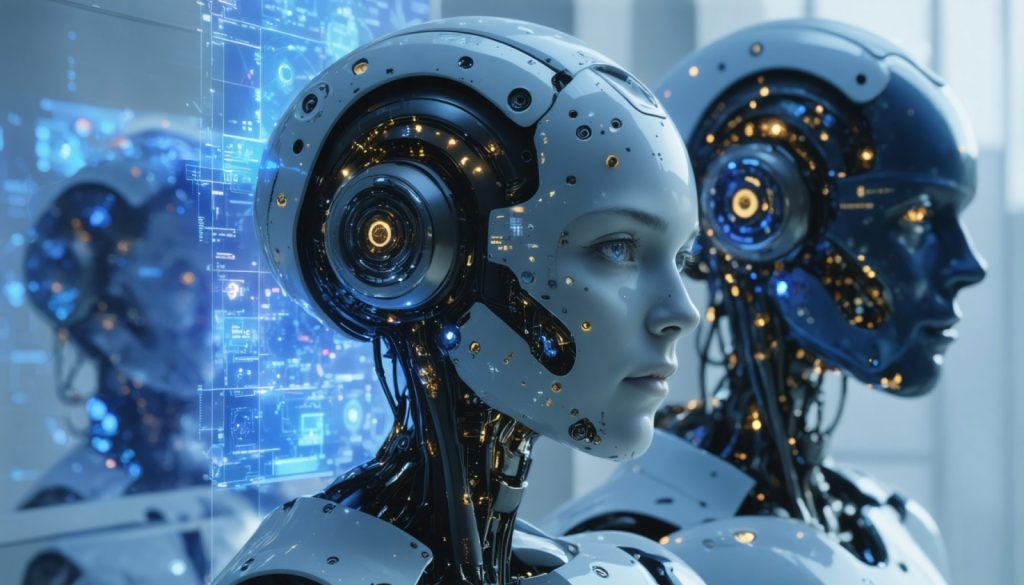
- Bill Gates envisions a future where artificial intelligence blurs the line between human and machine capabilities, transforming everyday and specialized tasks.
- AI is poised to revolutionize work, making elite expertise more accessible and redefining professional roles within the next decade.
- There is cautious optimism about AI’s role in replacing human jobs, with only 14% of business owners expecting significant changes by 2025.
- The AI skills gap is widening, making proficiency in AI as crucial as basic literacy for future employment—87% of businesses seek AI-proficient hires.
- Gates advocates for embracing AI as a collaborative partner, emphasizing its importance in shaping future innovation and opportunity.
Bill Gates envisions a future shimmering with the potential of artificial intelligence, where the boundaries between human capability and machine intelligence blur to almost nothing. On the Tonight Show with Jimmy Fallon, the former CEO of Microsoft painted a vivid picture of an AI-driven world, where everyday tasks and even specialized professions could become the domain of machines rather than humans.
As Gates delved into the shifting landscape, he mused about the AI revolution promising to redefine what it means to work. In his eyes, the dawn of a new era within the next decade is inevitable, where we entrust AI with roles traditionally reserved for human intelligence—be it providing expert medical advice or offering personalized education. The promise of AI is not just efficiency, but excellence, potentially making elite expertise commonplace and accessible.
Yet, this forecast has not been met with uniform enthusiasm. Trepidation weaves through conversations about AI replacing human jobs. The Impact of Technology on the Workplace report by Tech.co highlights a modest 14% of business owners acknowledging significant employment changes due to AI by 2025. Despite Gates’ optimism, the widespread adoption of AI in critical roles remains cautious, largely due to prevalent errors inherent in the technology today.
Gates acknowledges this cautious dance, suggesting that while machines may not replace humans in most sectors immediately, preparing for that future is essential. The gap between current skills and future needs is widening—an AI skills gap that risks leaving many behind as this technological tide advances. To remain relevant, gaining a foundational understanding of AI has become as crucial as grasping basic literacy—87% of businesses now deem AI proficiency vital for new hires, a sharp rise from just 66% in 2023.
The world is on the brink of transformation, where intelligence is no longer a rare gift but a shared resource, free to all through AI. The key takeaway from Gates’ vision is clear: Embrace AI not only as a tool but as an integral partner in shaping the future. As we stand at this crossroads of innovation, one thing is certain—those who choose to understand AI today will become the architects of tomorrow.
How AI is Revolutionizing the Future: Insights from Bill Gates’ Vision
The AI Transformation: A New Era of Possibilities
As Bill Gates elaborated on the future potential of artificial intelligence (AI) on the Tonight Show with Jimmy Fallon, he painted a picture of a world where AI will increasingly become a part of our daily lives. In this envisioned future, AI is set to reshuffle the landscape of work and expertise, making advanced knowledge more accessible and democratized.
Steps to Prepare for the AI Future
1. Upskilling and Reskilling: The urgency to acquire AI-related skills is rising. Pursue online courses, workshops, and certifications in AI and machine learning to stay ahead of the curve. Platforms like Coursera and edX offer comprehensive AI programs.
2. Embracing Lifelong Learning: As AI continues to evolve, so should our learning habits. Engage in continuous learning by following AI thought leaders and staying updated with the latest advancements.
3. Collaboration with AI: Instead of seeing AI as a competitor for jobs, view it as a collaborator that can enhance human capabilities.
Real-World Use Cases
AI is already making significant strides in various sectors:
– Healthcare: AI-driven diagnostic tools are improving accuracy in disease detection and patient care.
– Education: Virtual tutors powered by AI are personalizing learning experiences for students.
– Finance: AI algorithms are transforming financial services, from fraud detection to automated trading.
Market Forecasts and Industry Trends
With the rapid integration of AI, the global AI market is projected to grow exponentially. According to Allied Market Research, the AI market size was valued at $62.35 billion in 2020 and is expected to expand at a compound annual growth rate (CAGR) of 40.2% from 2021 to 2030.
Addressing Controversies and Limitations
While AI promises many benefits, concerns about job displacement and ethical issues persist:
– Job Displacement: Automation could replace repetitive and lower-skilled jobs, posing a challenge for the labor market.
– Ethical Concerns: AI choices must be transparent and unbiased, necessitating strict regulation.
Insights and Predictions
Looking ahead, it is likely we will see greater integration of AI in sectors that benefit from data analysis and decision support. This will lead to the growth of hybrid roles where humans and machines work together.
Recommendations for Individuals and Businesses
– Embrace Technology: Businesses should integrate AI technology to optimize operations and gain a competitive edge.
– Policy Advocacy: Support policies that foster AI innovation while ensuring ethical standards are maintained.
Conclusion: The Way Forward
The transformative power of AI is inevitable. As we navigate this technological transition, embracing change and preparing for the future is crucial. Take proactive steps to build AI literacy and leverage AI as a powerful ally in both personal and professional realms.
For more insights on cutting-edge technologies, explore resources at Microsoft and Gates Notes.



